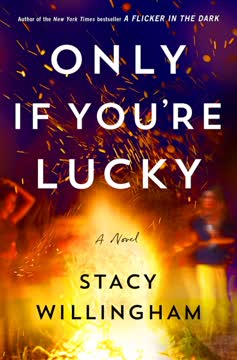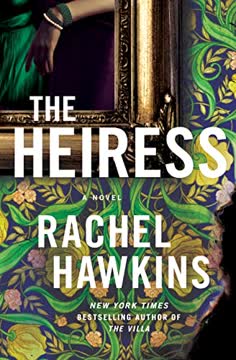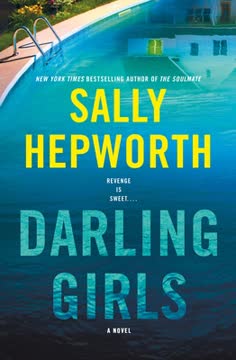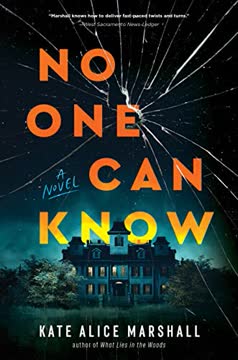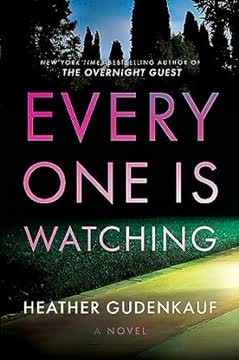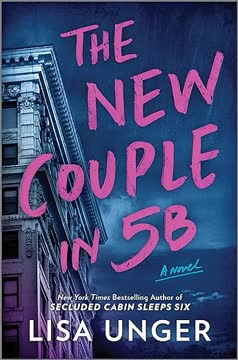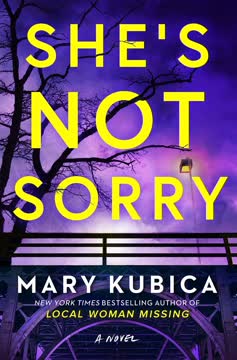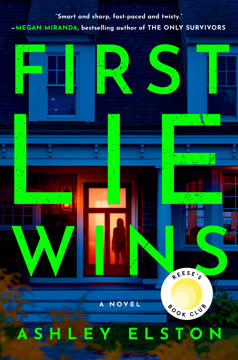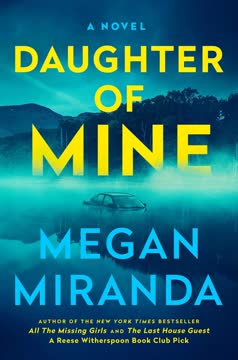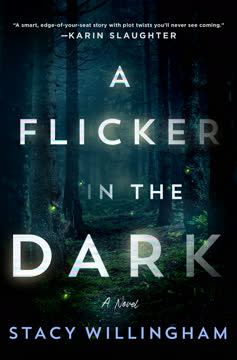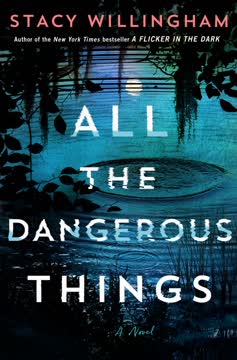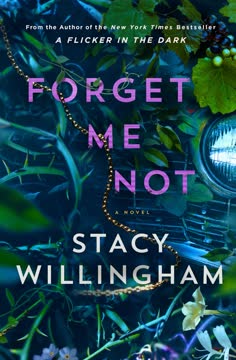Plot Summary
New Beginnings, Unseen Connections
Margot, a college sophomore, seeks a fresh start by moving in with Lucy, Sloane, and Nicole. The allure of Lucy's enigmatic personality captivates her, offering an escape from the haunting memory of her best friend, Eliza. As Margot navigates her new environment, she becomes aware of the complex dynamics between her roommates and the fraternity boys next door. The fraternity-owned house provides a sense of belonging but also serves as a reminder of the power imbalance and secrets lurking beneath the surface.
The Game of Truths
During a night of drinking, Lucy introduces a twisted version of Spin the Bottle, where truths and dares expose vulnerabilities and desires. Margot confronts her feelings about Levi, a boy linked to Eliza's death. The game becomes a catalyst for deeper connections and unspoken rivalries, as Lucy's probing questions unsettle the group. Margot's unease grows, realizing Lucy's interest in Levi might be more than just a game, hinting at a dangerous attraction to chaos.
Secrets and Shadows
As the semester progresses, Margot learns about the fraternity's hazing rituals, including a claustrophobic initiation in the house's crawl space. Levi's involvement in these rituals and his connection to Eliza's death weigh heavily on Margot. She grapples with guilt, feeling Levi should have suffered, not Eliza. Meanwhile, Lucy's behavior becomes erratic, and Margot suspects her new friend is hiding something significant. Tensions between the roommates and fraternity boys intensify, as secrets threaten to unravel their fragile bonds.
The Unraveling of Trust
Margot's trust in her new friends is shaken when she discovers bruises on Nicole's wrists, reminiscent of past traumas. The revelation of Lucy's blood on Levi's clothes raises questions about their relationship and the events leading to Levi's death. Detective Frank's investigation into Lucy's disappearance and Levi's death puts pressure on the group, forcing them to confront their complicity in the unfolding drama. Margot struggles to reconcile her desire for belonging with the moral ambiguity of her new life, as the lines between right and wrong blur.
A Dangerous Dance
Lucy's fascination with Levi becomes a dangerous dance, as she flirts with the boundaries of their relationship. Margot watches helplessly as Lucy's actions mirror Eliza's reckless behavior, drawing her closer to the edge. The tension between Lucy and Levi reaches a boiling point, as their interactions become increasingly charged with unspoken desires and hidden agendas. Margot fears history is repeating itself, and Lucy's attraction to danger will lead to a tragic end. The group's fragile unity is tested as they navigate treacherous waters of love, loyalty, and betrayal.
The Weight of Guilt
Haunted by memories of Eliza and her role in her death, Margot grapples with overwhelming guilt. Her relationship with Levi is strained by their shared past, and she struggles to find a way forward. As the investigation into Lucy's disappearance intensifies, Margot is forced to confront her complicity in the events that have unfolded. The pressure mounts as Detective Frank closes in, and Margot must decide whether to protect her friends or reveal the truth. The burden of her secrets threatens to consume her, as she searches for redemption and closure.
The Final Confrontation
The tension reaches a climax as the truth about Lucy, Levi, and Eliza is finally revealed. Margot confronts the reality of her new life and the choices she has made. The investigation uncovers shocking revelations about Lucy's past and her connection to Levi's death. As the group faces the consequences of their actions, Margot must decide where her loyalties lie. In a dramatic confrontation, the characters reckon with their demons and the impact of their decisions. The story concludes with a sense of resolution, as Margot finds a way to move forward, forever changed by the events that have transpired.
Secrets Unravel in Darkness
Under the stars, Lucy confesses her estrangement from her family, revealing she has no home to return to. This vulnerability exposes a side of Lucy that Margot has never seen, deepening their bond. Margot reflects on her reliance on her parents and the stark contrast with Lucy's independence. The revelation that Lucy has been living without familial support shocks Margot, making her realize the depth of Lucy's struggles and the facade she maintains.
Confrontations and Revelations Unfold
Margot grapples with the complexities of her relationships as she returns home for the holidays. Her interactions with her parents highlight the distance between them, and her mother's disapproval of her choices adds to her stress. Meanwhile, Margot's visit to Eliza's parents reveals a hidden envelope of money, hinting at secrets Eliza kept. The discovery of Lucy and Levi together further complicates Margot's emotions, as she struggles to understand Lucy's intentions and her own feelings of betrayal.
The Weight of Hidden Truths
As Margot returns to Rutledge, the weight of her unresolved feelings about Eliza and Levi's deaths looms large. The discovery of Levi's body on the island sends shockwaves through the group, forcing Margot to confront her complicity in the events that have unfolded. Detective Frank's investigation intensifies, and Margot must navigate the delicate balance between protecting her friends and revealing the truth. The burden of her secrets threatens to consume her as she searches for redemption.
A Web of Deception
As the investigation into Levi's death deepens, Margot uncovers more about Lucy's past and her connection to Eliza. The revelation that Lucy is Eliza's half-sister, born from an affair, adds a new layer of complexity to the story. Margot realizes Lucy's presence in her life was not a coincidence, but a calculated move to step into Eliza's world. The discovery of Lucy's true identity forces Margot to reevaluate her relationships and the choices she has made.
The Final Reckoning
In a dramatic confrontation, Margot and her friends reckon with the consequences of their actions. The truth about Lucy's involvement in Levi's death and her motivations for infiltrating their lives is revealed. As the group faces the fallout, Margot must decide where her loyalties lie and how to move forward. The story concludes with a sense of resolution, as Margot finds a way to come to terms with her past and embrace a future shaped by the lessons she has learned.
Characters
Margot
Margot is a college sophomore haunted by the death of her best friend, Eliza. Her journey is one of self-discovery, as she navigates complex relationships and uncovers hidden truths. Margot's desire for acceptance and her struggle with guilt drive her actions, leading her to confront her past and seek redemption.
Lucy
Lucy is a charismatic and enigmatic presence in Margot's life. Her true identity as Eliza's half-sister and her motivations for infiltrating Margot's world are slowly revealed. Lucy's complex relationship with Levi and her connection to Eliza's death add layers of intrigue to the story.
Levi
Levi is linked to Eliza's death and Margot's past. His involvement in the fraternity's hazing rituals and his connection to Lucy create tension within the group. Levi's struggle with guilt and his desire for redemption mirror Margot's own journey.
Sloane
Sloane is a grounded and pragmatic presence in the group. Her loyalty to her friends is unwavering, but she is not afraid to challenge them when necessary. Sloane's relationship with Lucas adds depth to her character, as she navigates the complexities of love and friendship.
Nicole
Nicole is a kind and empathetic character who struggles with her own insecurities and the pressures of her relationship with Trevor. Her vulnerability is exposed when she becomes entangled in the group's secrets, and her journey is one of self-discovery and empowerment.
Detective Frank
Detective Frank is the relentless force driving the investigation into Lucy's disappearance and Levi's death. His presence adds tension and urgency to the story, as he uncovers the hidden truths that bind the characters together.
Plot Devices
The Game of Truths
The game of truths introduced by Lucy serves as a pivotal plot device, exposing the vulnerabilities and desires of the characters. It acts as a catalyst for deeper connections and unspoken rivalries, setting the stage for the unfolding drama. The game highlights the moral ambiguity of the characters' actions and foreshadows the dangerous consequences of their choices.
The Crawl Space
The crawl space beneath the house is a significant plot device, representing the hidden fears and secrets that lie beneath the surface. It serves as a physical manifestation of the characters' internal struggles and the darkness that threatens to consume them. The crawl space is a place of initiation and degradation, reflecting the power dynamics and moral complexities of the story.
The Missing Picture
The missing picture of Eliza serves as a haunting reminder of the past and the unresolved tensions between the characters. It symbolizes the loss and guilt that Margot carries with her, as well as the dangerous allure of Levi and the impact of his actions. The picture is a tangible link to the past, driving Margot's quest for redemption and closure.
Analysis
"Only If You're Lucky" explores the intricate web of secrets, guilt, and redemption that binds its characters. Through Margot's journey, the story delves into themes of belonging, the complexity of human relationships, and the moral ambiguity of choices. The narrative challenges readers to consider the impact of hidden truths and the weight of past actions on the present. As Margot navigates her new life, she learns that true redemption comes from confronting one's past and embracing the lessons learned. The book serves as a poignant reminder of the power of truth and the resilience of the human spirit in the face of adversity.
Last updated:
FAQ
0. Synopsis & Basic Details
What is Only If You're Lucky about?
- A Quest for Belonging: Margot, a college sophomore, seeks a fresh start at Rutledge after the tragic death of her best friend, Eliza. She finds an unexpected connection with the enigmatic Lucy and moves into an off-campus house with Lucy, Sloane, and Nicole, hoping to find the deep, meaningful friendships she lost.
- Unraveling a Web of Secrets: As Margot settles into her new life, she discovers unsettling similarities between Lucy and Eliza, and a disturbing connection between Lucy and Levi Butler, the boy linked to Eliza's death. The story follows Margot's journey to uncover the truth behind Lucy's mysterious past and her true intentions, leading to a series of shocking revelations.
- A Thriller of Psychological Depth: The narrative delves into themes of identity, manipulation, and the blurred lines between good and evil, as Margot grapples with her own complicity and guilt. It explores how far individuals will go to belong and protect their chosen family, culminating in a dramatic confrontation that redefines loyalty and justice.
Why should I read Only If You're Lucky?
- Deep Psychological Thriller: Readers who enjoy psychological thrillers that delve into complex character motivations and moral ambiguities will find this book captivating. It's a masterclass in narrative misdirection, keeping you guessing about who to trust and what's truly happening.
- Exploration of Toxic Friendships: The novel offers a nuanced exploration of female friendships, showcasing how they can be both a source of profound connection and intense manipulation. It's perfect for those interested in the darker side of human relationships and the lengths people go to for acceptance.
- Subtle Symbolism & Foreshadowing: Stacy Willingham expertly weaves in subtle clues, recurring motifs, and rich symbolism that reward close reading. If you appreciate stories where every detail might hold a hidden meaning, enhancing the overall depth and re-readability, this book is a must-read.
What is the background of Only If You're Lucky?
- Southern College Town Setting: The story is set in Rutledge, a fictional college town in South Carolina, characterized by its old houses, proximity to both the beach and forests, and a vibrant Greek life scene. This setting provides a backdrop of both idyllic charm and underlying wildness, reflecting the characters' dual natures.
- Author's Personal Inspiration: As revealed in the acknowledgments, Stacy Willingham drew inspiration from her own college experience at the University of Georgia, living in a fraternity-owned house with a connecting shed and a mysterious crawl space. This personal connection lends an authentic, lived-in feel to the novel's unique setting and atmosphere.
- Exploration of Grief and Identity: The narrative is deeply rooted in Margot's unresolved grief over Eliza's death, which occurred three weeks after their high school graduation. This personal tragedy shapes Margot's vulnerability and her desperate search for a new identity and belonging, driving much of the story's emotional core.
What are the most memorable quotes in Only If You're Lucky?
- "You're only young once, and only if you're lucky." (Chapter 5): This quote encapsulates a central theme of the novel: the fleeting nature of youth and the choices made during this period. It highlights the characters' reckless pursuit of experience and belonging, often at great cost, and foreshadows the irreversible consequences of their actions.
- "If you knew you could get away with murder, would you do it?" (Chapter 18): This chilling question, posed by Lucy, is a pivotal moment that sets the psychological tone for the entire story. It directly challenges the characters' moral compasses and foreshadows the dark path they will ultimately take, exploring the thin line between consequence and desire.
- "It is possible to be both. Radically both." (Chapter 44): This line, echoing themes from Dr. Jekyll and Mr. Hyde, speaks to the complex, dual nature of the characters, particularly Lucy and Margot. It suggests that good and evil, love and violence, can coexist within a single person, challenging simplistic notions of morality and justifying extreme actions.
What writing style, narrative choices, and literary techniques does Stacy Willingham use?
- Dual Timeline Narrative: Willingham employs a "BEFORE" and "AFTER" structure, alternating between the past events leading up to Levi's death and Lucy's disappearance, and the present-day police investigation. This narrative choice builds suspense, gradually revealing crucial information and allowing readers to piece together the puzzle alongside Margot.
- First-Person Limited Perspective: The story is told entirely from Margot's point of view, immersing the reader in her subjective experience, her grief, her paranoia, and her evolving understanding of events. This unreliable narration creates ambiguity and forces the reader to question Margot's perceptions and interpretations, enhancing the psychological tension.
- Rich Symbolism and Foreshadowing: The author masterfully uses recurring symbols like the "Jekyll and Hyde" motif, constellations (Gemini), and environmental details (the crawl space, the full moon) to deepen thematic resonance and subtly foreshadow plot developments. This technique invites close reading and adds layers of interpretive depth to the narrative.
1. Hidden Details & Subtle Connections
What are some minor details that add significant meaning?
- Lucy's Necklace and Eliza's Allusion: Lucy's diamond constellation necklace, which she claims her father gave her because she was named after "Lucy in the Sky with Diamonds," is a subtle but crucial detail. It directly links her to Mr. Jefferson (Eliza's father) and his past affair, foreshadowing her true identity and her calculated infiltration of Eliza's life. This detail is a key piece of the "Lucy Sharpe identity explained" puzzle.
- The Running Toilet Tank: The malfunctioning toilet tank in Lucy and Margot's shared bathroom, which runs at all hours, is initially presented as a minor inconvenience. However, Lucy's casual suggestion that Levi might have been "tinkering with the toilet tank" on Halloween night (Chapter 27) becomes a plausible, yet misleading, explanation for his presence in their house, subtly deflecting Margot's suspicions.
- Lucy's Unwavering Sobriety: Margot notes that Lucy rarely drinks during crucial moments, such as the game of truths at Penny Lanes (Chapter 18) or the Thanksgiving dinner (Chapter 32). This detail highlights Lucy's calculated nature and her need to maintain control and "keep her wits about her" while manipulating others, revealing her strategic "Lucy motivations" and foresight.
What are some subtle foreshadowing and callbacks?
- "Nine Floors of Whores" Toast: Lucy's provocative toast on the first night in Hines Hall, "To us, nine floors of whores" (Chapter 2), subtly foreshadows the objectification and exploitation the girls will experience from the fraternity boys. It hints at the underlying power dynamics and the way the girls are perceived and used, setting a tone for the "themes in Only If You're Lucky" regarding gender and power.
- Sloane's "Too Nice" Warning: Sloane's early assessment of Margot as "too nice" and "vanilla" (Chapter 8), coupled with her warning that Lucy "looks for" malleable people, directly foreshadows Margot's transformation and Lucy's manipulative influence. It highlights Margot's vulnerability and her desire to be "changed," setting the stage for her complicity in later events.
- The "Radically Both" Concept: The repeated reference to Dr. Jekyll and Mr. Hyde and the phrase "radically both" (Chapter 22, 44) foreshadows the complex moral landscape and the characters' capacity for both good and evil. It prepares the reader for the shocking revelations about Margot's own actions and the blurred lines of culpability in the story's climax, offering a deeper "Only If You're Lucky analysis" of human nature.
What are some unexpected character connections?
- Lucy and Mr. Jefferson's Paternity: The most unexpected connection is the revelation that Lucy is Eliza's half-sister, and Mr. Jefferson is her biological father. This hidden truth explains Lucy's deep-seated envy, her meticulous study of Eliza's life, and her calculated plan to infiltrate Margot's world, providing a profound "Lucy Sharpe motivations explained" insight.
- Levi's Role as Eliza's Confidant: It's revealed that Eliza confided in Levi about Lucy's existence and her suspicions about Lucy breaking into her house. This unexpected bond between Eliza and Levi, driven by a shared secret, explains their closeness and Levi's later attempts to investigate Lucy, adding layers to the "Levi Butler character analysis."
- Nicole's Assault and Levi's Witnessing: The connection between Nicole's assault by Trevor on Halloween and Levi witnessing it is a crucial, hidden detail. Levi's inaction, driven by his pledge status and fear of Trevor, explains the subsequent tension and avoidance between Nicole and Levi, and ultimately fuels Nicole's rage, leading to Levi's death. This "Nicole character development" is deeply tied to this traumatic event.
Who are the most significant supporting characters?
- Mr. Jefferson: Eliza's father, whose past affair with Lucy's mother is the catalyst for Lucy's entire scheme. His character is significant not only for his biological connection to Lucy but also for his role in inadvertently creating the circumstances that lead to Eliza's death and Lucy's vengeful plot. His grief and guilt are palpable, making him a tragic figure in the "Only If You're Lucky character analysis."
- Danny DeMarcus: Lucy's former high school classmate, Danny, provides crucial information about Lucy's past, including her previous relationship with Parker and the rumors surrounding his death. His casual revelations about Fairfield and Lucy's history are instrumental in Margot's unraveling of Lucy's true identity and motivations, serving as a key source for "Lucy Sharpe background explained."
- Trevor: As the Kappa Nu president and Nicole's boyfriend, Trevor embodies the toxic masculinity and power dynamics within the fraternity. His hazing of Levi and his assault on Nicole are direct causes of the tragic events, making him a central antagonist whose actions drive much of the plot's conflict and the characters' desperate measures. His character highlights the "themes in Only If You're Lucky" related to abuse of power.
2. Psychological, Emotional, & Relational Analysis
What are some unspoken motivations of the characters?
- Margot's Desire for Replacement: Margot's deepest unspoken motivation is to replace Eliza, not just in her life, but in her identity. She admits, "I need something to take her place. Someone else who can slip into her skin." This drives her immediate attraction to Lucy, who embodies Eliza's wildness, and explains her willingness to overlook Lucy's red flags, seeking a "second chance" at the intense friendship she lost. This is central to "Margot motivations explained."
- Lucy's Quest for Eliza's Life: Lucy's primary unspoken motivation is to claim the life she believes was rightfully hers, the life Eliza lived. Having been rejected by her father, Mr. Jefferson, and forced to watch Eliza's "perfect" family from afar, Lucy meticulously studies Eliza's habits and relationships to seamlessly step into her shoes. Her actions are driven by a profound sense of injustice and a desire for belonging and recognition from her biological father. This is a core aspect of "Lucy Sharpe motivations."
- Levi's Pursuit of Justice/Answers: Beyond his initial attraction to Eliza, Levi's unspoken motivation, particularly after Eliza's death, is to uncover the truth about what happened to her. His attempts to get close to Lucy, despite his fear of heights and claustrophobia (which makes his hazing in the crawl space particularly cruel), are driven by a suspicion that Lucy was involved, making him a tragic figure seeking "Levi Butler justice."
What psychological complexities do the characters exhibit?
- Margot's Survivor's Guilt and Identity Diffusion: Margot exhibits profound survivor's guilt over Eliza's death, compounded by her own complicity in their final argument. This guilt leads to identity diffusion, where she struggles to define herself outside of Eliza's shadow, making her highly susceptible to Lucy's influence. Her internal conflict between her "nice" self and her capacity for anger and violence is a key "Margot character analysis" point.
- Lucy's Sociopathic Manipulation and Envy: Lucy displays traits of sociopathic manipulation, meticulously planning her infiltration into Eliza's life and exploiting the vulnerabilities of those around her. Her deep-seated envy of Eliza's privileged life and family fuels her calculated deceit, making her a complex antagonist whose actions are driven by a twisted sense of entitlement and a desire for revenge. This is crucial for understanding "Lucy Sharpe psychology."
- Nicole's Trauma Response and Suppressed Rage: Nicole's psychological complexity stems from her sexual assault by Trevor, which she initially suppresses due to shame and fear. Her subsequent weight loss, withdrawal, and eventual violent outburst against Levi (mistaking him for Trevor) are manifestations of her unaddressed trauma and suppressed rage, highlighting the devastating impact of her experience. This offers a deep "Nicole character analysis."
What are the major emotional turning points?
- Margot's Decision to Move In with Lucy: This is a pivotal emotional turning point for Margot, representing her conscious choice to abandon her safe, albeit lonely, life with Maggie and embrace the unknown with Lucy. It signifies her desperate yearning for a new identity and intense connection, marking the beginning of her deep entanglement in Lucy's world. This moment is key to "Margot's emotional journey."
- The Game of Truths and Lucy's Question: Lucy's question to Levi, "If you knew you could get away with murder, would you do it?" (Chapter 18), is an emotional turning point for the entire group. It exposes their hidden capacities for darkness and plants a seed of moral ambiguity that will later justify their actions, shifting the emotional landscape of their relationships. This is a critical "Only If You're Lucky plot analysis" moment.
- The Revelation of Lucy's True Identity: The discovery that Lucy is Eliza's half-sister and Mr. Jefferson's illegitimate daughter is the ultimate emotional turning point. It shatters Margot's perception of Lucy, Eliza, and her own past, forcing her to re-evaluate every interaction and understand the profound depth of Lucy's calculated revenge and her own unwitting role in it. This is the core of "Lucy Sharpe explained."
How do relationship dynamics evolve?
- Margot and Lucy: From Admiration to Complicity: Their relationship evolves from Margot's initial admiration and longing for Lucy's attention to a complex bond of shared secrets and complicity in murder. Lucy initially grooms Margot, exploiting her grief and desire for belonging, but by the end, Margot actively participates in Lucy's cover-up, transforming their dynamic into a twisted form of loyalty. This is central to "Margot and Lucy relationship analysis."
- The Roommates' Shifting Loyalties: The dynamic between Margot, Sloane, and Nicole shifts dramatically from casual roommates to a tightly knit unit bound by a dark secret. Initially, Sloane is wary of Lucy, and Nicole is kind but naive. However, as Lucy's manipulations and the consequences of their actions unfold, their individual loyalties are tested, ultimately solidifying into a pact of silence and mutual protection against external threats. This highlights "friendship themes in Only If You're Lucky."
- Levi and Eliza: A Toxic Obsession: The relationship between Levi and Eliza is revealed to be one of toxic obsession, with Levi stalking Eliza and Eliza using his attention for validation. This dynamic, which ultimately leads to Eliza's death, sets a dangerous precedent that Lucy attempts to replicate and exploit, showcasing the destructive nature of their connection. This is a key part of "Levi and Eliza relationship explained."
4. Interpretation & Debate
Which parts of the story remain ambiguous or open-ended?
- Lucy's Final Intentions: While Lucy's plan to infiltrate Eliza's life is clear, her ultimate "Lucy Sharpe motivations" regarding Levi remain somewhat ambiguous. Was she genuinely falling for him, or was her flirtation purely a calculated move to extract information or further her revenge? Her final words, "I don't want to keep running... I'm not going to take the fall," suggest a shift, but her true emotional state towards Levi is left open to interpretation.
- The Extent of Margot's Memory Blackout: Margot frequently experiences blackouts or hazy memories, particularly around pivotal events like the night Eliza died and the night Levi died. While some are attributed to alcohol or drugs, the narrative leaves room to debate how much of her memory loss is genuine and how much is a psychological defense mechanism, or even a subtle narrative manipulation by Margot herself. This contributes to the "unreliable narrator" aspect of "Only If You're Lucky analysis."
- The Future of the Roommates' Pact: The ending solidifies the roommates' bond through shared guilt and complicity, but the long-term sustainability of their pact remains open-ended. The novel concludes with the understanding that "if one goes down, we all go down," but the psychological toll and potential for future unraveling are left for the reader to ponder, inviting debate on the true nature of their "friendship themes in Only If You're Lucky."
What are some debatable, controversial scenes or moments in Only If You're Lucky?
- Margot's Complicity in Eliza's Death: The revelation that Margot physically pushed Eliza, causing her to fall to her death, is highly controversial. While Margot frames it as an accident, her preceding anger and desire for Eliza to "suffer the consequences" make her culpability debatable. This scene forces readers to confront the blurred lines of intent and consequence, challenging the initial perception of Margot as a purely sympathetic protagonist. This is a central point for "Margot's guilt analysis."
- The Justification of Lucy's Revenge: Lucy's elaborate scheme to infiltrate Eliza's life and seek revenge on her biological father, Mr. Jefferson, is a morally complex and controversial aspect. Readers may debate whether her actions, driven by a lifetime of rejection and envy, are justifiable, or if they simply perpetuate a cycle of violence and manipulation. This fuels discussions around "Lucy Sharpe motivations" and "themes in Only If You're Lucky" regarding justice and retribution.
- The Roommates' Collective Cover-Up: The decision by Margot, Sloane, and Nicole to cover up Levi's murder and frame Lucy is a highly controversial act. This collective choice, driven by self-preservation and a twisted sense of loyalty, forces readers to question the morality of their actions and the extent of their transformation under Lucy's influence. It sparks debate on the nature of friendship and the corrupting power of secrets.
Only If You're Lucky Ending Explained: How It Ends & What It Means
- The Triple Murder & Frame-Up: The "Only If You're Lucky ending explained" reveals a shocking triple layer of death and deception. Eliza's death was an accident, caused by Margot pushing her during an argument. Levi's death was a murder, committed by Nicole who mistook him for Trevor during a rage-fueled attack, seeking revenge for her assault. Lucy's death was also a murder, committed by Sloane to protect Nicole and prevent Lucy from exposing their secrets. The roommates then conspire to frame Lucy for Levi's murder, using her past and fabricated evidence to make her disappearance seem like a flight from justice.
- Margot's Full Transformation: Margot, initially a passive observer haunted by guilt, fully embraces her darker capabilities. She orchestrates the frame-up, meticulously planting evidence (the missing picture, personal items) in Lucy's room to paint a picture of Lucy as an obsessed stalker and killer. Her final act of taking Lucy's constellation necklace symbolizes her complete absorption of Lucy's identity and her acceptance of her own "radically both" nature, signifying her profound "Margot character development."
- A New, Darker Bond: The three surviving roommates—Margot, Sloane, and Nicole—are now inextricably linked by their shared crimes and secrets. Their bond, once forged from necessity and convenience, has curdled into a "thicker than blood" pact of mutual protection. The ending suggests that while they have achieved a twisted form of belonging and escaped immediate consequences, the "blood on your hands" will forever be a part of them, a permanent "tattooed" mark that defines their new, darker reality. This offers a chilling "Only If You're Lucky analysis" of friendship and complicity.
Review Summary
Only If You're Lucky received mixed reviews. Many readers found it slower-paced and more character-driven than Willingham's previous thrillers, with some describing it as more YA or New Adult. The college setting and focus on female friendships resonated with some, while others found the characters unlikeable. Several reviewers praised the twists and ending, though some felt the buildup was too long. Overall, opinions were divided, with some longtime fans disappointed and others appreciating Willingham's change in style.
Similar Books
Download PDF
Download EPUB
.epub digital book format is ideal for reading ebooks on phones, tablets, and e-readers.
